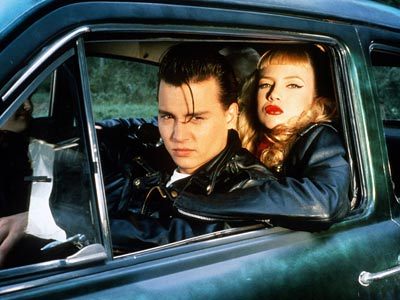
Real men don’t like movies with singing in them, right? Well, not necessarily. There’s a bunch of movies out there with singing throughout that are actually pretty cool. I’m not sure if they are considered “musicals” or not, but there’s no need to deal with semantics. Maybe the concept of the movie itself is great, or maybe there’s a tune or two that you can’t help but sing along to (privately, of course), but in any case, here are nine movies with singing throughout that it’s okay to like if you’re a dude:
1. Crybaby (1990)

Why It’s Cool: Johnny Depp plays a rebellious Drape, shocking and offending the Squares that live in Baltimore. It’s always fun to see a crew of rebel bad asses terrifying the uptight masses.
Best Scene: Pretty much anytime Drapes kiss each other, flailing their tongues around in each other’s mouths.
Best Song: “King Cry-Baby” - Johnny Depp channels Elvis and rocks out with a big rebel flag displayed behind him, effectively moistening various va-jay-jays in the audeience.
2. Sweeney Todd: The Demon Barber of Fleet Street (2007)

Why It’s Cool: An insane barber, played by Depp, hacks and slashes his customers with a razor and turns their remains into meat pies with the help of Ms. Lovett, played by Tim Burton regular Helena Bonham Carter. Sacha Baron Cohen also appears and steals every scene he is in.
Best Scene: Todd’s murder of the corrupt Judge Turpin, played by Alan Rickman. Nice and bloody, just how I like it.
Best Song: “The Worst Pies in London” - Johnny Depp is great, but he’s not a terrific singer by any stretch. Helena Bonham Carter, though, is pretty good, and she delivers this tune quite well.
3. The Wizard of Oz (1939)

Why It’s Cool: Judy Garland teams up with a brainless scarecrow, a heartless tin man, and a cowardly lion in a quest to find the Wizard of Oz. Along the way, they encounter a city of Munchkins, flying monkeys, and a wicked witch. Groovy.
Best Scene: When the Wicked Witch of the West sends off her gang of flying monkeys. Those things are awesome.
Best Song: “Somewhere Over the Rainbow” is the most famous and memorable, but for me, nothing beats the Scarecrow spazzing to “If I Only Had a Brain.”
4. South Park: Bigger, Longer, and Uncut (1999)

Why It’s Cool: Come on, it’s South Park. The boys try to stop the execution of Canadian stars Terrance and Phillip so that Satan (and Saddam) don’t take over the world. Also, lots of cursing.
Best Scene: Probably anytime Saddam objectifies Satan and treats him like nothing more than a big red cum dumpster.
Best Song: There’s a lot to choose from, but “Uncle Fucka” by Terrance and Phillip takes the cake.
5. Willy Wonka and the Chocolate Factory (1971)

Why It’s Cool: This movie is Gene Wilder at his best. As Wonka, he gives a tour of his legendary chocolate factory to children who were lucky enough to find a golden ticket in the wrapper of a Wonka Bar. All the children, except for Charlie, meet horrible fates, and Wonka doesn’t really seem to give a F.
Best Scene: The terrifying ferry ride through the tunnel in Wonka’s factory.
Best Song: Spoiled Veruca Salt’s rendition of “I Want it Now.” The little bitch thinks she’s entitled to anything and everything. The Oompa-Loompas are good, but they can’t touch Veruca.
6. The Nightmare Before Christmas (1993)

Why It’s Cool: Monsters, skeletons, ghouls, and the like are brought to life via stop-motion photography, creating the surreal, creepy world of Halloween Town.
Best Scene: Jack Skellington’s climactic rescue of Sally and Santa from the evil Oogie Boogie, a charcter just slightly more offensive to blacks than Jar-Jar Binks.
Best Song: “What’s This?” which is sung by composer Danny Elfman. Talented dude, that Elfman.
7. Little Shop of Horrors (1986)

Why It’s Cool: Seymour Krelborn, in exchange for money, fame, and a chance at Audrey, feeds people to his talking, singing plant. Plants eating people = rule.
Best Scene: When masochist Arthur Denton, played by Bill Murray, reaches orgasm as a result of Orin Scrivello drilling his teeth. “You are something special! You are something special!”
Best Song: I love Steve Martin’s “Dentist,” but the recently departed Levi Stubbs’ performance of “Feed Me” is filled with soul and sets the tone for the rest of the movie.
8. The Lion King (1994)

Why It’s Cool: This movie is Disney at its finest, with great animation, voice acting, music, and even action throughout.
Best Scene: The last scene of the movie, where the mandrill Rafiki presents Simba’s newborn cub to the Pride Land for all to see.
Best Song: “Hakuna Matata,” an anthem for those who stop giving a sh*t and just want to live in the moment.
9. Grease (1978)

Why It’s Cool: High schoolers racing cars, dancing, and trying to get laid during their senior year — what’s not to like about that?
Best Scene: When Danny Zuko reunites with Sandy at a night time school event and - because he’s hanging with his boys - acts like a total dick and pretends he doesn’t really care.
Best Song: Danny and Sandy’s duet of “Summer Nights,” setting up years and years of drunk couples belting out the lyrics at Karaoke bars.
I love musicals! Check me out in the Puma shirt!













